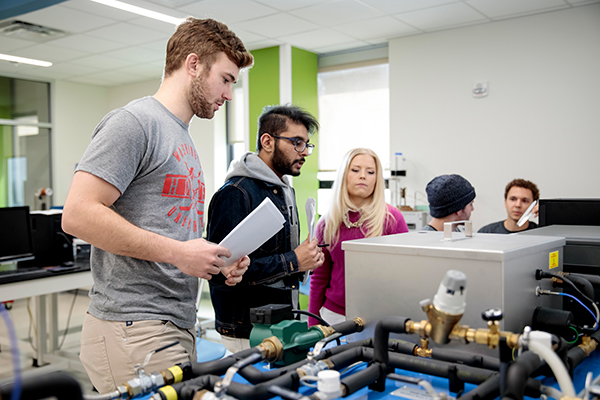Today's mechanical engineer must be soundly educated in the mechanics of solids and fluids, thermodynamics and heat transfer, the science of materials, and the principles and techniques of mechanical engineering design.
In studying mechanical engineering at Washington University in St. Louis, students and faculty work side by side on concerns in energy conservation and machine design, manufacturing, instrumentation, environmental control and biomechanics.
The degree awarded in this program is the B.S. in Mechanical Engineering.
The Bachelor of Science in Mechanical Engineering program is accredited by the Engineering Accreditation Commission of ABET, https://www.abet.org, under the General Criteria and the Mechanical Engineering program criteria.
Program Educational Objectives
Program educational objectives are broad statements that describe what graduates are expected to attain within a few years of graduation. These objectives are based on the needs of the program’s constituencies.
Within several years from graduation, graduates of the Bachelor of Science in Mechanical Engineering program are expected to:
• Engage in professional practice and/or advanced study.
• Further their knowledge and skills through education and/or professional development.
• Serve society by using and communicating their knowledge and values.
Student Outcomes
The Mechanical Engineering program has the following student outcomes that describe what students are expected to know and be able to do by the time of graduation. These relate to the knowledge, skills, and behaviors that students acquire as they progress through the program.
(1) an ability to identify, formulate, and solve complex engineering problems by applying principles of engineering, science, and mathematics
(2) an ability to apply engineering design to produce solutions that meet specified needs with consideration of public health, safety, and welfare, as well as global, cultural, social, environmental, and economic factors
(3) an ability to communicate effectively with a range of audiences
(4) an ability to recognize ethical and professional responsibilities in engineering situations and make informed judgments, which must consider the impact of engineering solutions in global, economic, environmental, and societal contexts
(5) an ability to function effectively on a team whose members together provide leadership, create a collaborative and inclusive environment, establish goals, plan tasks, and meet objectives
(6) an ability to develop and conduct appropriate experimentation, analyze and interpret data, and use engineering judgment to draw conclusions
(7) an ability to acquire and apply new knowledge as needed, using appropriate learning strategies
BSME Enrollment and Graduation Data
The BSME enrollment data tabulated below is for the end of the spring semester. The BSME graduate data is for the previous 12 months of the academic year ending in May.
| Academic Year |
Enrollment (all undergraduate levels) |
BS Graduates |
| 2018 |
308 |
81 |
| 2019 |
329 |
61 |
| 2020 |
338 |
98 |
| 2021 |
349 |
90 |
| 2022 |
341 |
84 |
| 2023 |
354 |
98 |
| 2024 |
383 |
107 |

